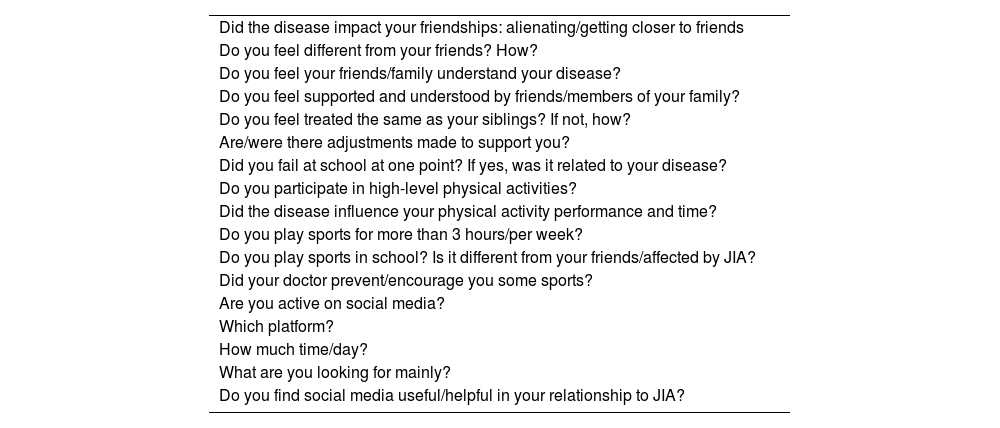Juvenile idiopathic arthritis is a chronic inflammatory condition interfering with daily activities, social integration, and school attendance in children because of pain and joint inflammation during disease flares. Online resources might help children with JIA improve their social interactions and enhance their knowledge about their disease and the available therapeutic strategies.
ObjectiveThis study aims to reveal the social issues encountered by teenagers prone to JIA and determine their perception of the impact of social media on their daily life.
Material and methodsWe conducted this study using inductive qualitative methods to describe the sociocultural perception and experience of adolescents with JIA aged between 8 and 16 years.
ResultsIndividual interviews were held with 22 adolescents diagnosed with JIA. Fifty-two percent felt like outcasts and rejected by their peers because of their illness. Most of the participants expressed a need for their friends to be informed about their JIA diagnosis. Twenty-two-point-seven percent stated that they played sports for more than 5h a week. A total of 31.8% found their physical performance was not affected by their disease. Ninety-seven of the participants confirmed that they use social media on average 3h a day. YouTube and Facebook were ranked respectively as the first and the second preferred platforms. Seventeen percent of the children viewed these platforms as positive and helpful in dealing with JIA, especially by taking their minds off the pain, dealing with the stress resulting from the lack of mobility, and facilitating interactions with others.
ConclusionSocial integration in children with JIA is still challenging. Social media is helpful in managing JIA and improving social interactions, and in gaining useful information.
La artritis idiopática juvenil (AIJ) es una enfermedad inflamatoria crónica que interfiere en las actividades diarias, la integración social y la asistencia a la escuela en los niños, debido al dolor y la inflamación de las articulaciones durante los brotes. Los recursos en línea podrían ayudar a los pacientes con AIJ a mejorar sus interacciones sociales y ampliar sus conocimientos sobre la condición y las estrategias terapéuticas disponibles.
ObjetivoRevelar los problemas sociales a los que se enfrentan los adolescentes con AIJ y determinar su percepción del impacto de las redes sociales en su vida diaria.
Materiales y métodosEste estudio utilizó métodos cualitativos inductivos para describir la percepción sociocultural y la experiencia de los adolescentes con AIJ de entre 8 y 16 años.
ResultadosSe realizaron entrevistas individuales a 22 adolescentes diagnosticados de AIJ. De estos, 52% se sentían marginados y rechazados por sus compañeros debido a su enfermedad. La mayoría expresaron la necesidad de que sus amigos estuvieran informados sobre su diagnóstico de AIJ. Alrededor de 22% afirmó practicar deporte más de 5 horas a la semana y 31,8% consideró que su rendimiento físico no se veía afectado por la enfermedad. Un total de 97% de los participantes confirmaron utilizar las redes sociales una media de 3 horas al día. YouTube y Facebook se situaron respectivamente como la primera y la segunda plataformas preferidas. De los niños, 17% consideraba que estas plataformas eran positivas y útiles para hacer frente a la AIJ, especialmente porque les permitían olvidarse del dolor, lidiar con el estrés derivado de la falta de movilidad y facilitar las interacciones sociales.
ConclusiónLa integración social de los niños con AIJ sigue siendo un reto. Las redes sociales son útiles para controlar la AIJ y mejorar las interacciones sociales, así como para obtener información útil.
Artículo
Comprando el artículo el PDF del mismo podrá ser descargado
Precio 19,34 €
Comprar ahora







